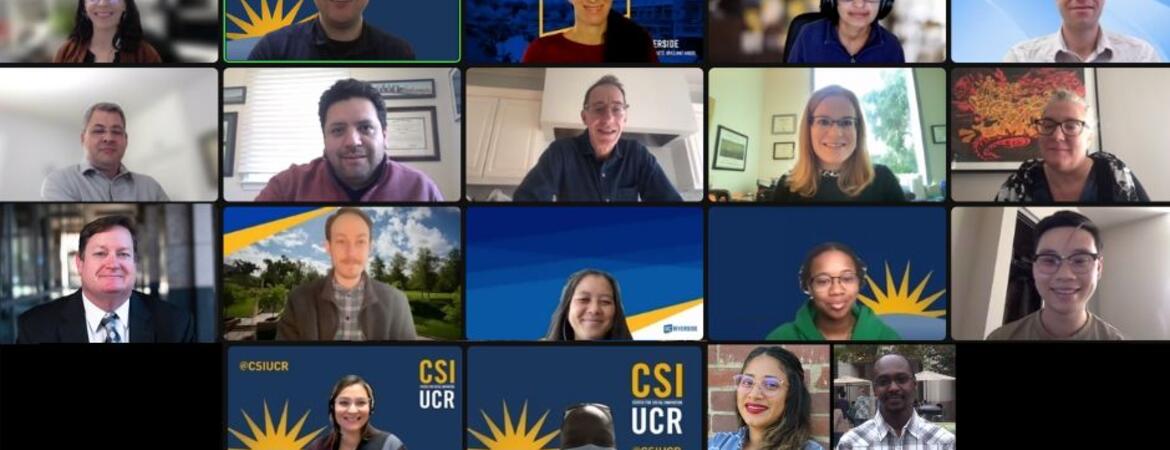Center for Social Innovation

Riverside, CA - the IE Data Summit on Environment, Climate, and Energy, hosted in partnership with CSI-UCR and IE RISE, took place Wednesday, February 1, 2023 via Zoom.
This was the third in a series of IE Data Summits taking place as quarterly events with rotating topics. Convening over 110 participants online, this quarter’s summit focused on environment, climate, and energy, which was a topic requested by participants from previous summits. In the first half of the summit - the research showcase - participants heard about recent research pertaining to air quality, water quality, land use change, and climate change resiliency planning in the Inland Empire. In the second half of the summit, online data tools were presented to regional practitioners, expanding the accessibility of environmental health indicators critical to adaptation and mitigation planning.
The research showcase, designed to provide the community with digestible and relevant local environmental research advances, featured research from academic institutions such as UCR, Pitzer College, and Loma Linda University School of Medicine and government agencies like the Western Riverside Council of Governments (WRCOG) and the Santa Ana Watershed Project Authority (SAWPA). Through the CE-CERT lab, OASIS initiative, Salton Sea Task Force, and more, UCR is a regional leader in environmental, climate change, and energy sustainability research. For this Data Summit, UCR Assistant Professor of Climate Change and Sustainability in the Department of Environmental Sciences, Dr. Francesca Hopkins, presented her most recent research on Reductions in California’s Urban Fossil Fuel CO2 Emissions During the COVID-19 Pandemic. Dr. Hopkins described significant decreases in roadway carbon emissions because of the reduced commuter traffic during the 2020 COVID 19 pandemic lockdown. Moving to off-road emissions in the Inland Empire, there was little difference in 2020 and 2021 emissions due to the competing effects of a reduction in commuter emissions and an increase in logistics traffic emissions.
Hopkins’ findings aligned with the report presented by Dr. Susan Phillips, Professor of Environmental Analysis and Associate Dean at Pitzer College as well as Director of the Robert Redford Conservancy for Southern California Sustainability. Dr Phillips discussed her most recent work, A Region in Crisis, the Rationale for a Public Health State of Emergency in the Inland Empire done in collaboration with CCAEJ and the Sierra Club Chapter of San Gorgonio. The report looked at air quality impacts from vehicle emissions due to the continued growth of warehousing in the region. Dr. Phillips provided a compelling example of the type of warehouse growth typical in the region with a visual time series of warehouse growth in Fontana.
Loma Linda School of Medicine students Thomas Hile and Nataly Escobedo Garcia presented their publication Assessment of tap water quality in mobile homes in Eastern Coachella Valley on unsafe drinking water in the Oasis Mobile Home Park in Coachella Valley. Jeff Mosher from SAWPA discussed the themes that emerged from listening sessions in Santa Ana River Watershed Community Water Experiences, An Ethnographic Strengths and Needs Assessment across diverse stakeholders including native communities, non-native local communities, elected officials, water agencies, and mutual water companies. Chris Gray from WRCOG presented on the Resilient IE Toolkit done in collaboration with the San Bernardino County Transportation Authority. To conclude the research showcase, a local nonprofit, GRID Alternatives IE, presented information that will be included in their 2022 Impact Report. Grid Alternatives IE highlighted their work reducing energy and fossil fuel use in the Inland Empire while creating good paying jobs and training programs in solar energy.
Data Tool Demonstrations provided an opportunity for novice and expert users to learn how to use online indicators that can help inform climate change mitigation and adaptation decisions. Data Tools that were included in this event were, South Coast Air Quality Management District’s MATES V Data Visualization Tool, the UCLA Heat Maps data tool, and UC Berkeley's Cal-Adapt data tool. Data Tool Demonstrations took place in back-to-back breakout sessions, where audience members could walk through two of the three different tools with one of the tool’s engineers. The Data Tool demonstrations highlighted ways for practitioners to obtain more information critical to environmental health and climate change resiliency planning.
Event attendees represented a diverse group from government, academic, nonprofit, and civic engagement organizations who reported using data for research, advocacy, community engagement, grant writing, and strategic planning. One attendee from the nonprofit sector applauded the event, sharing, “Thank you for sharing these tools with us, it's very much needed. Some organizers within nonprofits need more assistance when it comes to retrieving data. There is a lot of great work being done by researchers and I would like to continue being more informed and in the loop!”
For more information about this event and past IE Data Summit Events, you can follow the links below to see recordings of the events.
IE Data Summit: Environment, Climate, and Energy
IE Data Summit: Health and Well-Being (Second Data Summit)
IE Data Summit (First Data Summit)
IE Data Summit - AskCHIS Breakout Session
IE Data Summit - DataQuest and CA School Dashboard Breakout Session
IE Data Summit - CalEnviroScreen Breakout Session
IE Data Summit - Race Counts Breakout Session
For more information on future IE Data Summits, please contact Eric Calderon at eric.calderon@ucr.edu.